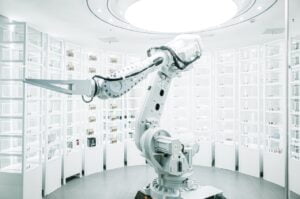7 Best Artificial Intelligence Universities 2023 in the World and High Paying Jobs and Career in AI and the Average Salary Packages in AI Jobs.
Table of Contents
History Of AI in Education
Here is some brief history of AI.
The study of artificial intelligence started as a subject in universities around 1956. The term “artificial intelligence” was created at a research project called the Dartmouth Summer Research Project on Artificial Intelligence (DSRPAI) led by John McCarthy and Marvin Minsky in the same year.
But the roots of AI go back to earlier work in philosophy, mathematics, and computer science. In 1936, Alan Turing wrote a paper called “On Computable Numbers, with an Application to the Entscheidungsproblem,” which laid the groundwork for theoretical computer science. Turing’s work also explored the idea of creating a machine that could be as smart as a human, known as the Turing test.
After the Dartmouth conference, people were very excited and optimistic about what AI could do. However, there were also some setbacks to research in the 1970s and there was a period called the “AI winter” when funding for AI research decreased. But in 1980s, AI research started to pick up again, and recently, there has been a lot of progress in the field. This progress is thanks to new technologies like deep learning and big data, which allow AI systems to be trained on bigger and more complex sets of information.
Today, AI is used in many different areas, such as healthcare, transportation, finance, and customer service. As AI continues to develop, it will likely have an even bigger impact on our lives in the future.
Here are 7 Best Artificial Intelligence Universities 2023
Artificial intelligence is one of the most rapidly advancing fields in modern technology. It is revolutionizing the way we communicate, work, and live. As a result, there is a growing demand for AI professionals.
If you are interested in a career in AI, you will need to get a degree from a top university. Here are some of the best universities for AI in the world:
- Carnegie Mellon University (CMU) is consistently ranked as the top university for AI. CMU’s Computer Science department is home to the world-renowned Robotics Institute, and the university offers a variety of undergraduate and graduate programs in AI.
- Massachusetts Institute of Technology (MIT) is another top university for AI. MIT’s Computer Science and Artificial Intelligence Laboratory (CSAIL) is one of the leading research labs in the world, and the university offers a variety of undergraduate and graduate programs in AI.
- Stanford University is a third top university for AI. Stanford’s Computer Science department is home to the Stanford AI Lab, and the university offers a variety of undergraduate and graduate programs in AI.
- University of California, Berkeley (UC Berkeley) is a top public university for AI. UC Berkeley’s Computer Science department is home to the Berkeley AI Research (BAIR) lab, and the university offers a variety of undergraduate and graduate programs in AI.
- University of Toronto is a top Canadian university for AI. The University of Toronto’s Computer Science department is home to the Vector Institute for Artificial Intelligence, and the university offers a variety of undergraduate and graduate programs in AI.
- University of Oxford is a top UK university for AI. The University of Oxford’s Computer Science department is home to the Oxford AI Group, and the university offers a variety of undergraduate and graduate programs in AI.
- MBZUAI offers a variety of Master’s and Ph.D. programs in AI, as well as an Undergraduate Research Internship Program (URIP). The university’s faculty is made up of leading experts in AI from around the world.

| 7 Best Artificial Intelligence Universities 2023 |
| Carnegie Mellon University (CMU) |
| Massachusetts Institute of Technology (MIT) |
| Stanford University |
| University of California |
| University of Toronto |
| University of Oxford |
| MBZUAI |
These are just a few of the many top universities for AI in the world. If you are interested in a career in AI, and you can research these universities and even others institutes to find the best fit for you.
Top Programs and Certifications in Artificial Intelligence [2023]
Here are some of the AI learning programs available in universities:
1. Undergraduate programs:
- Bachelor of Science in Artificial Intelligence: This program provides students with a strong foundation in the fundamentals of AI, such as machine learning, natural language processing, and computer vision. Students may also take electives in specific areas of AI, such as robotics or healthcare.
- Bachelor of Arts in Artificial Intelligence: This program is similar to a Bachelor of Science in Artificial Intelligence, but it focuses more on the philosophical and ethical implications of AI. Students may also take electives in other areas, such as philosophy or ethics.
2. Graduate programs:
- Master of Science in Artificial Intelligence: This program is designed for students who want to gain a deeper understanding of AI. Students typically take courses in machine learning, natural language processing, computer vision, and other areas of AI. They may also complete a research project or thesis.
- Ph.D. in Artificial Intelligence: This program is designed for students who want to conduct research in AI. Students typically take courses in machine learning, natural language processing, computer vision, and other areas of AI. They may also complete a dissertation.

3. Professional certificate programs:
- Professional Certificate in Artificial Intelligence: This program is designed for working professionals who want to learn about AI without having to commit to a full degree program. Students typically take courses in machine learning, natural language processing, and other areas of AI.
- Executive Certificate in Artificial Intelligence: This program is designed for senior executives who want to learn about the implications of AI for their businesses. Students typically take courses in the business applications of AI, such as machine learning for marketing or natural language processing for customer service.
In addition to these programs, there are also a number of online AI learning programs available in 7 Best Artificial Intelligence Universities 2023. These programs are a great option for students who want to learn AI but who cannot attend a traditional university.
The type of AI learning program that is right for you will depend on your individual needs and goals. If you are just starting out, then an undergraduate program or a professional certificate program may be a good option. If you have some experience with AI and you want to specialize in a particular area, then a graduate program may be a better option.
What are The Jobs in Artificial Intelligence and What are Their Salary Packages?
Here are some of the highest-paying AI jobs and their salary packages
AI Engineer
AI Engineer is a skilled professional who designs, develops, and deploys artificial intelligence (AI) systems. They use their knowledge of machine learning, data science, and software engineering to create AI systems that can solve real-world problems.
AI Engineers typically have a bachelor’s degree in computer science, computer engineering, or a related field. Some employers may also require a master’s degree or Ph.D. in AI or a related field.
The average salary for an AI engineer is $157,077 per year. AI engineers are responsible for developing and deploying AI systems.
Machine Learning Engineer
A Machine Learning Engineer is a skilled professional who designs, develops, and deploys machine learning models. They use their knowledge of statistics, mathematics, and computer science to create models that can learn from data and make predictions.
Machine Learning Engineers typically have a bachelor’s degree in computer science, statistics, or a related field. Some employers may also require a master’s degree or Ph.D. in machine learning or a related field.
The average salary for a machine learning engineer is $146,457 per year. Machine learning engineers are responsible for developing and training machine learning models.

Data Scientist
A Data Scientist is a skilled professional who collects, analyzes, and interprets data. They use their knowledge of statistics, mathematics, and computer science to extract insights from data and make predictions.
Data Scientists typically have a bachelor’s degree in computer science, statistics, or a related field. Some employers may also require a master’s degree or Ph.D. in data science or a related field.
The average salary for a data scientist is $136,572 per year. Data scientists are responsible for collecting, cleaning, and analyzing data.
Robotics Engineer
A Robotics Engineer is a skilled professional who designs, builds, and programs robots. They use their knowledge of mechanical engineering, electrical engineering, and computer science to create robots that can perform tasks autonomously.
Robotics Engineers typically have a bachelor’s degree in mechanical engineering, electrical engineering, computer science, or a related field. Some employers may also require a master’s degree or Ph.D. in robotics or a related field.
The average salary for a robotics engineer is $129,721 per year. Robotics engineers are responsible for designing, building, and programming robots.

These are just a few of the many high-paying AI jobs. As the field of AI continues to grow, so will the salaries for AI professionals.
If you are interested in a career in AI, then you should be prepared to earn a high salary. However, it is important to note that AI is a demanding field, and you will need to have strong skills and experience in order to be successful.
Read More: China’s Economy Growth 2023 Slows Down Q2, Risk’s Implications For the Country and the World
Read More: Top 5 AI Tools For Business 2023
Read More: Best Price Of Samsung Galaxy Z Flip 5 and Galaxy Z Fold 5 and its Launch Date in 2023
Read More : Best Amazon Prime Day 2023 And Twitch Prime Loot
Read More : Different E-Commerce Strategies, Models For a Successful Business 2023
Read More :Can A Solar Storm In 2023 Causes Real A ‘Internet Apocalypse’






